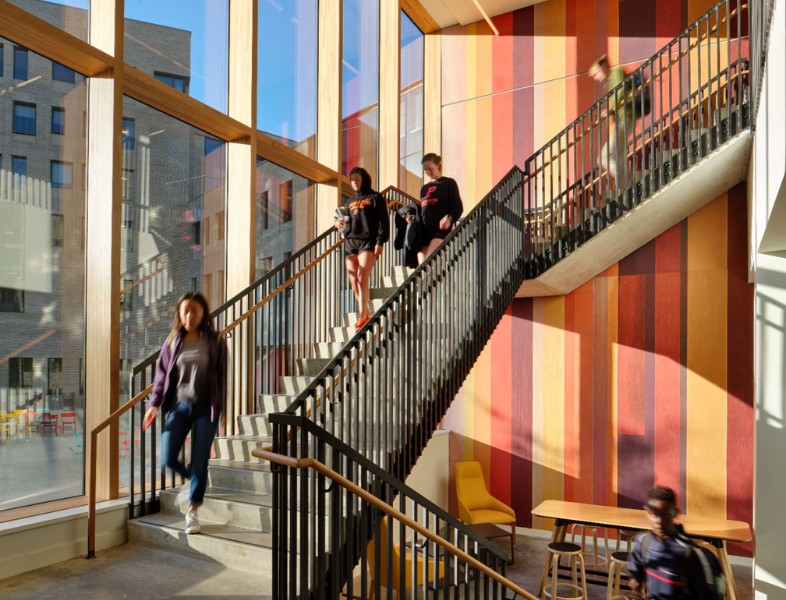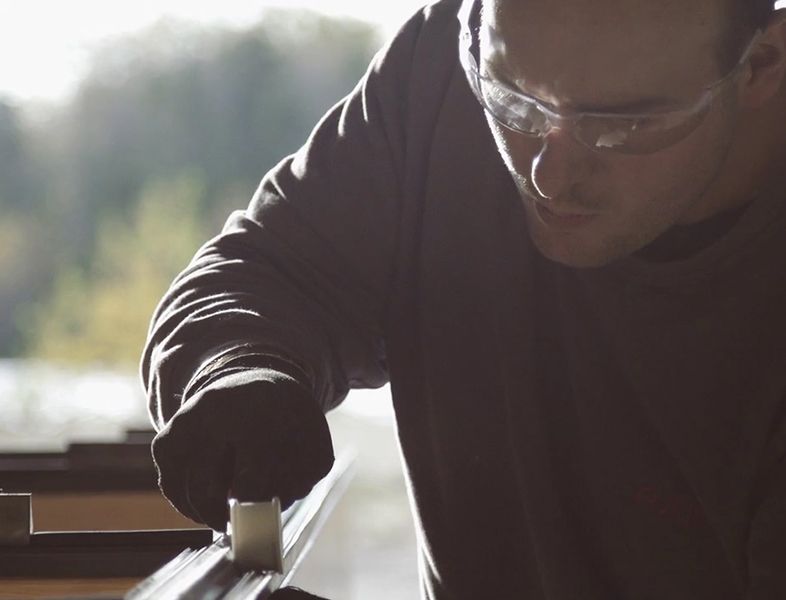How important is the method of glass manufacturing to a successful, productive, and safe job site?
As it turns out—extremely important.
Glazing products fabricated in a controlled factory setting typically offer superior precision and quality, streamlined logistics, improved worker safety and productivity, and even reduced environmental impact.
In this article, we’ll explore the key advantages of factory-based manufacturing for glazing products, the risks associated with on-site fabrication, and what it all means for architects, contractors, and building owners who depend on the safe delivery and installation of high-performance glass systems.
What’s the Difference Between On-Site and Factory Fabrication?
The distinction between factory and on-site fabrication in glazing mirrors the difference between modular (off-site) and stick-built (on-site) construction: Factory-based methods are generally faster, more cost-effective, and benefit from controlled conditions and rigorous quality control.
In the case of high-performance glazing products—such as insulating glass units (IGUs), timber and aluminum curtain walls, and aluminum skylights—factory fabrication ensures precise assembly of not just the glass, but also components like mullions, connectors, gaskets, membranes, and anchors.
By contrast, assembling these complex building envelope systems on-site exposes projects to weather delays, variable quality, logistical complexity, and elevated safety risks.
Why Controlled, Off-Site Glass Manufacturing Matters
Here’s a breakdown of the major benefits of factory-based fabrication:
1. Consistency and Precision
A factory’s stable, climate-controlled environment ensures that sealants cure under optimal conditions—avoiding the under- or over-curing issues common on job sites affected by extreme weather.
Factory-built glazing products benefit from:
- CNC precision machining for cutting, milling, drilling, and grooving
- Robotic sealant application, accurate to fractions of a millimeter
- Inline quality control tools like digital infrared thermography, pressure-decay testing, and leak detection
This level of precision is almost impossible to match with manual, on-site labor. And field fabrication often introduces tiny gaps or stress points, which can eventually compromise air and water tightness.
2. Streamlined Logistics
Pre-assembled glazing systems simplify job site logistics:
- Panels and units arrive ready to install, reducing crane time and onsite labor
- Less material handling means fewer scratches, dents, and surface damage
- Projects save valuable on-site storage space
The result: shorter project timelines, reduced material waste, and fewer opportunities for human error.
3. Enhanced Safety and Productivity
Construction sites are inherently risky: In 2023, the construction industry accounted for nearly 1 in 5 workplace fatalities in the U.S.
Factory environments significantly reduce these risks by offering:
- Safer, less congested workspaces
- Specialized lifting and handling equipment
- Less need for dangerous work at height
- Consistent PPE enforcement and oversight
Factory workers also tend to be more specialized, with deep knowledge of specific glazing systems, resulting in better quality and fewer call-backs or repairs down the line.
4. Weather-Independent Scheduling
Weather delays are one of the most common causes of construction slowdowns. On-site fabrication is vulnerable to:
- Rain
- Extreme temperatures
- Wind
- Snow or ice
Factory-built systems can be assembled regardless of external conditions, often in days rather than weeks, helping keep projects on schedule.
5. Sustainability and Waste Reduction
Off-site fabrication can reduce total project waste by up to 90%, thanks to:
- Better management of glass scrap, aluminum off-cuts, and excess sealants
- Optimized cutting processes and material usage
- Less packing debris and on-site clutter
The combination of lean manufacturing and less job site waste means a lower carbon footprint—an increasingly important metric for owners pursuing LEED certification or other green building standards.
Unicel Architectural: Leaders in Factory-Built Glazing Solutions
Moving glass fabrication into a controlled factory environment isn’t just a smart move—it’s often the difference between a streamlined project and one plagued by quality issues, delays, and safety concerns.
At Unicel Architectural, our precision-engineered IGUs, curtain walls, and skylight systems are built in-house using advanced fabrication techniques. This allows us to deliver:
- Superior product consistency
- Faster installation times
- Less job site risk
- Long-term performance that meets or exceeds design expectations
Experience the Difference
On-site assembly exposes projects to unpredictable variables. Factory-fabricated glazing systems, on the other hand, provide unmatched reliability.
Ready to learn more? Contact Unicel Architectural to explore our full range of high-performance, factory-built glazing solutions—from timber curtain walls to aluminum skylights.
News and Updates
The latest from Unicel Architectural

Strength in Design: The Case for Load-Bearing Timber Curtain Walls
- Product Spotlight



